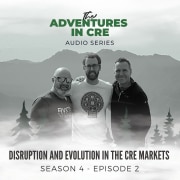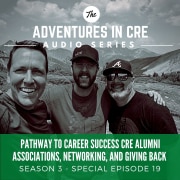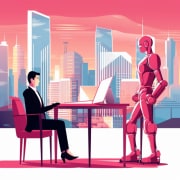AI Is Not a Fad: Why CRE Professionals Can’t Ignore AI | S6E2
In this episode of the Adventures in CRE Audio Series, Sam shares a surprising encounter in Boise that sparks a bigger conversation: is AI a true paradigm shift or just another passing trend in commercial real estate? Spencer introduces a bold thesis—those who ignore AI risk becoming the Kodaks of CRE—and Michael pushes back with thoughtful nuance, sparking one of the season’s most dynamic debates.
Together, the trio explores fear, adaptation, and what it really means to be “AI native” in today’s industry. They offer compelling real-world examples—from seasoned accountants to students in the classroom—making a strong case that the greatest threat isn’t the technology itself, but standing still while the industry evolves around you.
Watch, listen, or read this episode to get a preview of what’s ahead in Season 6 of the A.CRE Audio Series!
AI Is Not a Fad: Why CRE Professionals Can’t Ignore AI
Or Listen to this Episode
Resources from this Episode
- A.CRE Real Estate Financial Modeling Career Accelerator
- Education in Real Estate
- A.CRE Audio Series
- Defend your relevance and expand your advantage in CRE. Thrive in the era of AI with AI.Edge: https://theCREedge.AI
Episode Transcript
Sam Carlson (00:08):
So I am sitting at this coffee shop maybe a month and a half, two months ago. And normally people recognize you guys, nobody really recognizes me. I’m not the face and all that kind of stuff. I’m kind in the background. I do this and this is the most fun thing that I get to do. But I’m sitting there at the coffee shop, this guy comes up in Boise, Idaho, and he goes, are you Sam Carlson? I’m like, yes. And he goes, oh, I know you’re from Adventures in Syria. I’m like, this is crazy. So I’m sitting here talking with this guy, and our conversation got really deep, really fast, and the number one thing that people are talking about is artificial intelligence. But the sentiment that to me was the, I feel like it’s the undertone. I feel like it’s a thing that people are saying to in these small groups, but nobody’s really kind of talking about it openly, which is what is AI going to do? What do you think is going to happen with AI and commercial real estate business at large? But specifically, what is it going to do in commercial real estate? And and I talked for, I don’t know, 45 minutes and kind of went all over the board. He told me some of the things that they were doing with ai, which was incredible.
(01:25):
But I think that, again, the underlying tone is what is going to happen with artificial intelligence when it starts getting adopted or not getting adopted by commercial real estate professionals. It’s pretty cool. Everybody’s thinking about it, but what should they be thinking?
Spencer Burton (01:45):
Yeah. Well, let me bring to this episode a thesis statement
(01:51):
And we can batter around. What I love about this topic is nothing is baked. And so we can raise a thesis statement, some will agree, some will disagree. The thesis is this. There is a growing divide in our industry and others between firms and individuals who believe that this is a seismic change in everything. I mean everything versus those who view this as a fad, and not that everything will go back to the way it was before, but that this will largely run its course. And the impact on their firmer, or them as an individuals are fairly minimal.
(02:43):
But the thesis is there’s a growing divide that’s occurring, and that one of those is, well, the thesis is those who say that this is a fad are going to lose. Okay, I guess that would be the statement that’s worth debating. Now, what does lose mean? And where I go is to the story of Kodak. So if the AI optimists or the AI bowls, I guess it’d be the right term. If the AI bowls are correct, then we are running into a Kodak story at scale where those firms or those individuals who don’t adopt, who care more about protecting the status quo. It’s like, I’m really good at this thing, or I’m most comfortable with the way that I operate. Currently, the edge that I’ve built is sufficiently strong.
Sam Carlson (03:42):
AI can’t replace me,
Spencer Burton (03:44):
That it can’t replace me. And if you know the story of Kodak, right? In the mid seventies, an engineer at Kodak developed the digital camera, and it was brought to the senior team and the senior team in the interest of protecting what they viewed as their golden goose film squashed the idea, and the nineties and the two thousands hit and digital cameras became ubiquitous. And 2012 Kodak goes bankrupt. And so in the interest of protecting the status quo and the interest of protecting what they viewed as the most important aspect, they essentially put themselves on a path to ruin. And it took several decades because they were a behemoth. I mean, they were it in film. And so you look at real estate companies and real estate professionals today who are the Kodaks, and this is a rhetorical question, who’s at
Sam Carlson (04:44):
Risk without answer, but who is at risk of being the
Spencer Burton (04:48):
Kodaks? That’s right.
Sam Carlson (04:48):
Yeah.
Spencer Burton (04:50):
So the first question is, Michael, is the thesis, do you disagree with the thesis? And if you agree with the thesis, what is the characteristic of a modern day? Kodak?
Michael Belasco (05:03):
I don’t necessarily agree with the thesis and here’s why.
Spencer Burton (05:07):
Okay,
Michael Belasco (05:08):
Interesting. Kodak, and what came of Kodak was because of this big idea that was digital photography compared to film that wasn’t permeating into the masses. It was people had control of this technology and they could disseminate it. With ai, it’s been immediately accessible by people all over the org chart. So while there will be people, now we’re talking about job functions and things like that, and then we’re talking about mass implementation at the corporate level. I’m speaking currently about job functionality, whether it’s commercial real estate, whether it’s investment bank, whether it’s anything else. You have people in positions who might hold this opinion that AI is a fad. And I’ve seen it play out personally where everybody who thought that the second they were forced to be exposed to it, they were able to access it and it was immediately, immediately flipped. And they’re like, oh, well, how do I use this?
(06:17):
And it started being clunky and then they got better at it. So at the job level, I think it’s a function of forced adaptation because it’s immediately on display for everyone to see. Some people will be begrudging about it, I have to learn this new thing. But ultimately, everybody’s going to want to be preserving their job. So if you come into the office and you’re seeing somebody start to learn this, you’re going to get that. You’re going to see it, right? It’s not Kodak versus the other photography companies out there that are creating digital photography. This is like, oh my God, my job here is at risk. I need to adapt. So on that scale, I think there’s going to be mass force adaptation, at least in terms of implementing it. Some people will be better at implementing it than others, and other people will be more pioneers within their company learning how to actually integrate it. And
Sam Carlson (07:09):
I think that, so the Kodak one is a traditional example. I think the one that people might be thinking about that came on with a big roar and then it kind of fizzled is like crypto, crypto felt like crypto felt like a, everybody’s doing crypto, everybody’s doing this. And then it kind of faded, and now it’s finding relevance again because governments are accepting it, all these kind of things, but it doesn’t feel as pervasive. You cannot do crypto and be just fine.
Spencer Burton (07:43):
Or put another way. The hype around crypto didn’t play out.
Sam Carlson (07:47):
Exactly.
Spencer Burton (07:48):
I was hearing we were all going to be using digital currency within a decade.
Sam Carlson (07:53):
And what’s the trigger? What does human psychology do? Why did the executives at Kodak have a closed perspective on it?
Michael Belasco (08:01):
Yeah, I mean, that’s what we call the,
Sam Carlson (08:03):
It’s the survival mechanism.
Michael Belasco (08:04):
Yeah. Mean, that’s like the innovator’s dilemma. I mean, where do we preserve our base? Do we have this set structure? How do we innovate or do we innovate at all? And does this innovation destroy our golden goose?
Spencer Burton (08:18):
So we use Kodak as an example, and therefore we immediately go to, okay, what are the real estate companies that are going to be the AKs? But I actually think there are parallels at the individual level. And this is where you and I disagree a bit. Take a property accountant today, someone who’s been doing property accounting for 15, 20 years. They know all the nuance, and they believe that because they know all the nuance, they are safe. And I mean, no disrespect to our property accountant peers out there, but the day is coming where a digital entity will do most or all of our property accounting. But you’re sitting in a seat and you’re like, okay, well what does that mean for me? And the reflexes? I got 10 years left in my career. I want to fight this to the end again. But if you are the property accountant and you’re hearing this, there’s two paths you can take. The first path is you can be part of inventing what a better world for property accountants in our business looks like. Or you can throw your hands up in frustration that this is coming. And if you only have 10 years left in your career, maybe you slide your way to the end or maybe you don’t. By the way, Kodak did try to get into the digital camera business. It was too late, too late.
Sam Carlson (09:49):
I want to go back to say, throw your hands up in frustration. I don’t know people if that’s what behavior is happening. I feel like it’s throw your, I feel like it’s fear. I feel like people are just scared to try those things. And so they tell themselves, oh, I haven’t seen anything happening around my immediate circles. But they don’t understand what’s baking in the back rooms and what people are planning on doing with it.
Spencer Burton (10:22):
So actually, let me describe, because seen this, the throwing the hands up in the air, and maybe that’s a bit dramatic, but what it describes, and every one of us have seen this, what we do in real estate has sufficient nuance that you can’t just quickly bring in any of the off the shelf generalist tools and they’re going to fully automate it. And so throwing the hands up in the air to me is letting the perfect become the enemy of the good.
Michael Belasco (10:49):
I love
Spencer Burton (10:50):
Like, okay, well, I do this highly nuanced thing, and if there’s not an alternative that replaces me, I don’t want it. What if there was something that could reduce the time it took you to reconcile your counts from 60 minutes to 45 minutes and you get a 15 minute time saving, but you are managing hundreds of properties? Isn’t that worthwhile? But the hands up in the air is kind of like, ah, none of the tools out there really work. Well, I mean, yeah, or use it
Sam Carlson (11:21):
For incre a couple of 10 minutes
Spencer Burton (11:23):
Or that
Sam Carlson (11:23):
Too, and then be like, oh, yeah, this doesn’t work.
Spencer Burton (11:26):
Yeah, that’s what I’m describing, not the, well, I don’t want to innovate. Everyone says that they want to, but at the end of the day, when you’re comfortable with the tools and your existing process, change is frustrating, can be frustrating.
Michael Belasco (11:42):
But that’s where the unique opportunity lies for what we’re calling the AI natives, right? Yeah. Subject matter experts who understand it, where we’re using the accountant as the example throws up their hands. Well, if you have somebody that’s in that space but is also keeping up with everything going on, that gives their opportunity for these unique use cases to capitalize on and bring something new to the table. So
Sam Carlson (12:11):
Let’s say there’s somebody out there that is like, no, it is just a trend, right? That’s their thesis statement. They’re thinking, okay, well, it’s not going to affect me in my role, whatever that is, it can’t replace me. What do you say to that person to say, you might want to be a little bit more, and you might want to start tinkering and playing with these things because there’s two sides. There’s two potential outcomes. One, it does replace you and you get caught flat-footed. Or two, you replace somebody else with it because you were the person saying, you know what? I’m going to lean into this.
Michael Belasco (12:51):
Can I say everybody that I have met today, and I would not call. I’m not on the level of what Spencer’s doing. I am AI proficient. I can use a lot of the tools. I’m not steeped in it, but I would say that, and I am very much involved in real estate, and I interact with a lot of people and everybody, and I have friends and family that I’m bringing into my org. For example, my father, he’s hit his seventies. He’s retired, he’s a CPA, we have a small operation with the RV app business. And he’s like, I’m hanging around. I was like, why don’t you come and do the books? And then I have another friend where we were younger. We went out and bought a couple of rental properties, and both of these people in my life are sort of the AI fad people. I don’t think they said it was a fad, but they were like, ah, what do I need that for?
(13:41):
And with both of them, all it took was a random demonstration. For example, we have this property in Washington state. And so how my father came in and took over the books, and he had never used any generative AI at all. And he had all these questions and was like at first sort of a naysayer, and I said, go ask Washington State property law or how you define taxes or all these different things. He lives on it. Now he’s learning how to prompt it better. It’s amazing. And same thing with my buddy who runs the property. So everybody that I have seen in my life that’s been a, oh, this is a fad, or, oh, distrustful or whatever, became an immediate adopter. The second they saw how it benefits and it’s so immediately apparent how much it benefits anyone. So I have yet to see if somebody say it was a fad in my life and then hold firm to that. I don’t know. Do you have any examples of where there was no conversion? I feel like,
Spencer Burton (14:41):
Yeah. I mean, I kind of hang out with the choir though, but fair enough.
Sam Carlson (14:45):
Yeah, we’re all in eco chambers. We’re all using it.
Spencer Burton (14:47):
I will say this, I just came back from a big national conference and thousands of real estate professionals. This was barely on most people’s radar,
(15:00):
Which look, I get it. We’re in the business of space use. And so we’re out there creating space or leasing space or managing and investing in space and these sorts of fads. I don’t believe this is a fad, but these sorts of things, they’ve come and they’ve gone. And real estate has been largely constant. We’re slow to adapt to technology. And when we do have technology, it’s like as soon as we adopt it, it’s kind of what everyone uses. You have the incumbents, and as soon as they take hold and they’re just there. And so I get it, I get it. But there’s a reason why, and I’m obviously biased because I am all in and I’m making significant shifts in my personal career based on a belief that this technology is going to fundamentally change everything including real estate. And that’s the industry I love most. I do think this thesis is right. There will be a divide there, will put it another way. There will be winners and there will be Los losers, and I prefer to speak to those who want to be on the winner side of that column, but I empathize with those who very much could be the losers of all of this.
Michael Belasco (16:22):
And being a loser might mean that it’s an opportunity for you to reinvent yourself using what’s new out there. You might lose people if you’re losing a job or whatever. There’s this opportunity out there to reinvent yourself completely and pivot. It’s just this reinvention of anything. The tools you have access to now, the knowledge base you have access to, you can become an expert in switch. And I’m seeing that happen to folks that I interact with too outside of that. So being able to learn and adapt and evolve with this is critical. Even if you are a loser in your industry, there is an opportunity to read.
Sam Carlson (17:00):
Doesn’t it have a different threat and opportunity to every level of your career? If you’re a student, it’s going to have this opportunity slash threat in analysts and so on and so forth.
Spencer Burton (17:09):
Oh, most definitely. Right? Every stakeholder to this conversation, the threat and opportunity is different. But it goes to I Darwin, right? So everyone says survival of the fittest, but apparently
Sam Carlson (17:26):
That’s not right.
Spencer Burton (17:27):
Yeah, it’s actually a survival of the most adaptable or whatever. And in this context, it really doesn’t matter what stakeholder you are to this conversation, the key is to
Sam Carlson (17:41):
Adapt. You have to adapt.
Spencer Burton (17:43):
You have to adapt. Okay, so let’s talk to the students just for a second and then we’ll wrap this episode up. I think we’ve run on this thesis, but I’m frustrated with the students that I talk to.
Sam Carlson (17:55):
You were telling me about that class that you went to when we’re asking people, is that where you’re going to be?
Spencer Burton (17:59):
Yeah. Okay. Well,
Sam Carlson (18:02):
That kind of blew my mind a little
Spencer Burton (18:03):
Bit. Yeah. Look, we in industry expect the students to come in and have the greatest understanding and proficiency around the new technology, and that’s always been the case. You expect the young blood to come in with the new ideas. And that’s not the case here. This is interestingly enough, this is a trend where I feel like the analysts and associates and organizations are actually the ones who have done the most tinkering. And the students, and I don’t know if it’s because of what is being taught in the classroom or not being taught in the classroom, actually had this great conversation with one of the leaders of one of the top master or actually MBA in real estate programs in the country, and we’ll bring him on soon. Don’t want to name his name without permission, but he and I were just kind of talking through what needs to change in education. But what’s clear to me in that conversation, another I’ve had is that schools are asking this question, but right now, they’re not providing that foundation. So it feels like the students, they’re not hearing it in the classroom, and therefore they don’t feel the urgency that they should feel. And so when I speak to them, there is a general, I hate to say it, clueless.
(19:18):
They get chat GBT, because it helps them with assignments or whatever. And maybe they’re using meta’s AI on Instagram in order to have conversations with a fun little thing mean, but maybe because AI is not fun right now, when you’re a student outside of the classroom, you’re seeking, I’m not sure what it is, but I’m frustrated with the progress or lack thereof that the students are making in this.
Michael Belasco (19:42):
My take from hearing that is that, and we’ve experienced this, I know it feels archaic to even say it, but with Excel financial modeling when we were there, it’s sort of why A CRE became its thing at the time, and this is what’s going on now. It sounds like nobody that is on high teaching down to people understand what they should be teaching. They don’t know it yet. And it reminds me when we got to school and we heard you need to understand real estate finance, you need to understand Excel. That’s your, we heard it from practitioners, and I scrambled around the school looking for someone to teach me Excel and all these, we had very accomplished practitioners in commercial real estate, but none of them had any experience in Excel. And so that made Spencer, and I mean, I had the paranoia. You saw the opportunity, but we spent weekends trying to, like you said, tinker and figure it out. So that when you said that story, it sounds just like they don’t know where to go, and therefore there is an opportunity out there for students to lead the charge, and they just might not be there. Or maybe in other institutions, they could be,
Spencer Burton (20:48):
Well, I would argue the biggest opportunity of their life, and they don’t realize it because at this stage, it’s hard to have that sort of perspective. But having seen now wave after wave in my life of these sort of fundamental changes, this is, I mean, nothing compares to this.
Sam Carlson (21:06):
So if hiring managers aren’t asking about this right now, you think in a year’s time, every hiring manager is going to say, tell me what your extent of AI use and knowledge is
Spencer Burton (21:18):
For
Sam Carlson (21:18):
Students coming out of school.
Spencer Burton (21:19):
I think it’s absolutely coming. Yeah, it’s absolutely coming. We will talk about it in another episode, but there is a growing expectation that people in organizations are AI native. It’s a growing expectation, and yeah, you’d expect the hiring manager then to vet for them,
Michael Belasco (21:37):
And who are the people? Not only can you use it, not only can you use an LLM, but do you know how to integrate it? Can you help us lead the future of this industry, which AI will change not only ours, but every industry. Are you that person? So we’re at that moment in time,
Sam Carlson (21:54):
We have our thesis statement, what’s our resolution? What’s our summary statement?
Spencer Burton (21:58):
Well, why don’t you, I’ll give the summary statement from the AI bowl. That is when you have a divide like this, you pick the right path. It can be quite lucrative. And that doesn’t necessarily mean financially. I’m doing this because I highly value time, and this is the first time in my life I’ve come across a tool that unlocks time. And so if
Sam Carlson (22:26):
You’re on the side of this is a great opportunity, you got a big wave coming. If you’re on the side of, oh, this is just a fad, you might get hit by a tsunami
Michael Belasco (22:34):
And the time invested today will mt. I’m just building off of what you said, and it’s true the time you invest today in understanding this, whatever industry, you could be wanting to start a nursery growing plants, but if you spend time investing in this and understanding it now, that will multiply your time exponentially in the future. Right now is the moment. All right, that’s a great way to end.
Announcer (22:55):
Thanks for tuning into this episode of the Adventures and CRE audio series. For show notes and additional resources, head over to www.adventuresandcre.com/audio series.








